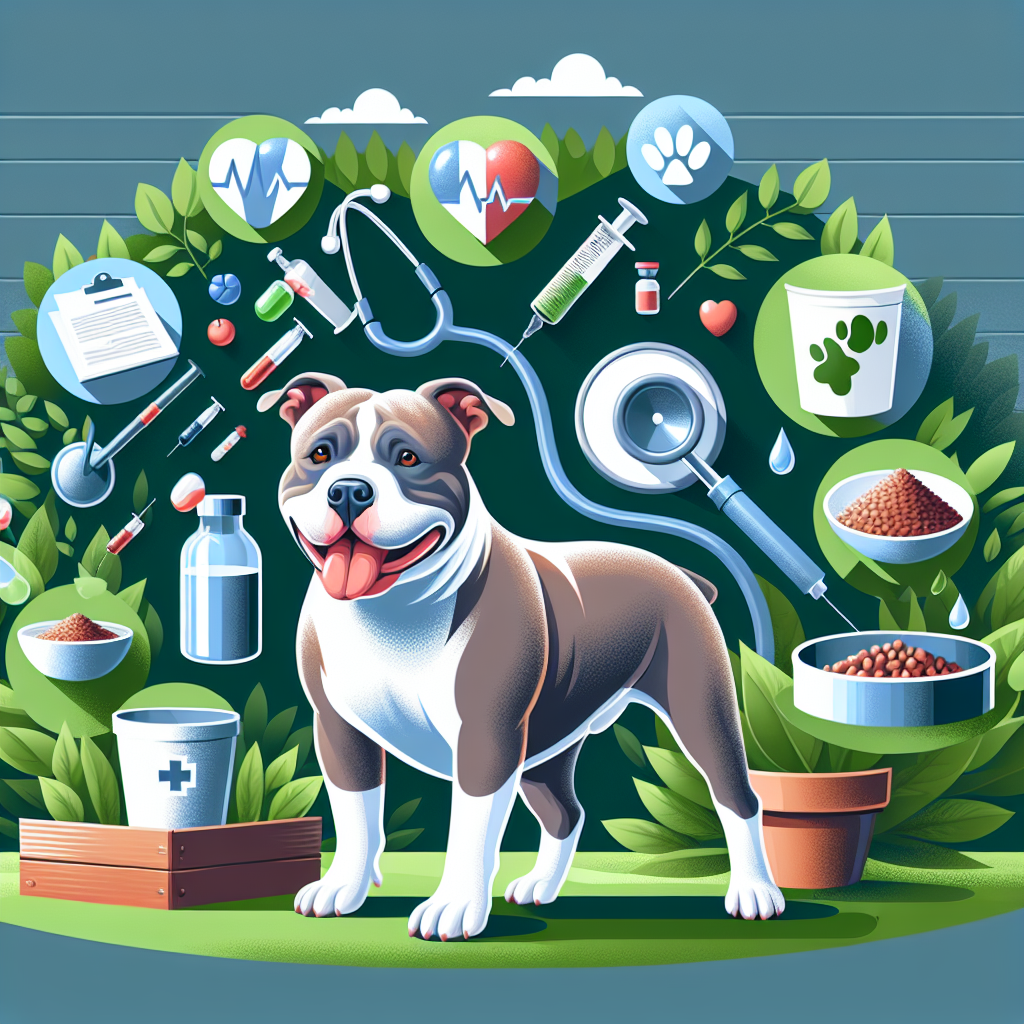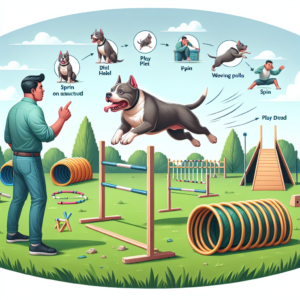Contents
- 1 Ensuring the Health and Wellness of Your American Bully
Ensuring the Health and Wellness of Your American Bully
Ensuring the health and wellness of your American Bully is one of the most important responsibilities of being a dog owner. Like any breed, American Bullies are prone to certain health issues, but with proactive care and attention, you can minimize the risks and maintain your dog’s long-term well-being. This article will cover common health concerns in American Bullies, the importance of regular veterinary care, and how to manage their diet and nutrition to promote a healthy, happy life.
Introduction: The Importance of Proactive Healthcare for American Bully Dogs
American Bullies are generally healthy and robust dogs, but just like any other breed, they are susceptible to specific health issues. Proactive healthcare is essential to detect and address potential problems early, ensuring a long and happy life for your dog. By establishing a routine for health maintenance, including regular veterinary visits, good nutrition, and preventive care, you can significantly improve your American Bully’s quality of life. In this article, we’ll discuss common health concerns, routine veterinary care, and how to provide the best nutrition to meet their needs.
Breed-Specific Health Concerns
American Bullies, like all purebred dogs, are more likely to suffer from certain genetic or breed-specific health conditions. Understanding these issues can help you detect symptoms early and seek the necessary treatment before they develop into serious problems.
-
1. Hip Dysplasia
Hip dysplasia is one of the most common health issues in American Bullies. This condition occurs when the hip joint doesn’t develop properly, leading to joint instability and eventually arthritis. It’s often inherited, though environmental factors like rapid growth, obesity, or excessive exercise can exacerbate it.
Signs to Watch For: Lameness, difficulty getting up, reluctance to exercise, or a “bunny hopping” gait.
Preventive Measures: Regular low-impact exercise, maintaining a healthy weight, and avoiding activities that put excessive stress on the joints can reduce the risk of hip dysplasia. Regular veterinary check-ups can include joint screenings to detect early signs.
-
2. Heart Issues
American Bullies are at risk for certain heart conditions, such as dilated cardiomyopathy (DCM), a disease that affects the heart muscle, leading to reduced heart function. This can be a genetic condition in some dogs.
Signs to Watch For: Coughing, fatigue, difficulty breathing, or fainting episodes.
Preventive Measures: Regular veterinary check-ups, including heart screenings, can help detect early signs of heart problems. Keeping your dog at a healthy weight and managing stress is important in preventing cardiovascular issues.
-
3. Allergies
American Bullies, particularly those with short coats, are prone to allergies that can affect their skin or digestive system. These can be triggered by environmental factors, food, or fleas.
Signs to Watch For: Itchy skin, hot spots, ear infections, vomiting, or diarrhea.
Preventive Measures: Consult with a veterinarian to identify allergens, and adjust their environment or diet accordingly. Regular flea preventatives and hypoallergenic foods may help reduce allergic reactions.
-
4. Respiratory Problems
Due to their muscular build and short muzzle, American Bullies can experience breathing difficulties, especially in hot weather or after exercise. This condition is often referred to as brachycephalic obstructive airway syndrome (BOAS).
Signs to Watch For: Labored breathing, excessive panting, snoring, or intolerance to heat.
Preventive Measures: Avoid strenuous exercise in hot or humid conditions, ensure they have access to fresh water at all times, and seek veterinary advice on managing their breathing issues.
-
5. Skin and Coat Conditions
American Bullies are also prone to skin conditions such as pyoderma, hotspots, and other bacterial or fungal infections due to their short coats and relatively sensitive skin.
Signs to Watch For: Redness, bumps, itching, excessive shedding, or unpleasant odors.
Preventive Measures: Regular grooming, bathing with appropriate dog shampoos, and maintaining a healthy diet to support skin health can reduce the risk of skin problems. Early treatment of any signs of infection is key.
Early Detection and Treatment
The key to managing breed-specific health issues is early detection. Regular veterinary check-ups and screenings can help identify any underlying conditions before they become serious. Speak with your veterinarian about specific health tests recommended for American Bullies, such as hip evaluations, heart screenings, and allergy testing.
Routine Veterinary Care
Regular veterinary visits are essential to ensure that your American Bully stays healthy throughout their life. Proactive care can catch problems early, giving your dog the best chance for a long and healthy life.
-
1. Regular Check-Ups
Scheduling annual or semi-annual check-ups is important for maintaining your dog’s overall health. During these visits, your veterinarian will perform a physical examination, discuss any behavioral changes, and assess your dog’s weight, mobility, and skin condition.
-
2. Vaccinations
Vaccinations are a critical part of preventive care. Puppies require a series of vaccinations, while adult American Bullies need booster shots throughout their lives. These vaccinations help protect against diseases such as rabies, parvovirus, distemper, and kennel cough.
Puppy Vaccination Schedule: Puppies should receive their first vaccinations at 6 to 8 weeks of age, with booster shots every 3-4 weeks until they are about 16 weeks old.
Adult Vaccination: Once fully vaccinated, adult dogs typically require booster shots every 1 to 3 years, depending on the vaccine.
-
3. Dental Care
Oral hygiene is just as important for dogs as it is for humans. American Bullies are prone to dental issues such as plaque buildup, gingivitis, and periodontal disease, which can affect their overall health.
Preventive Measures: Brushing your dog’s teeth regularly with a canine-friendly toothbrush and toothpaste can help prevent dental problems. Dental chews and treats designed to reduce tartar buildup are also beneficial.
Professional Cleanings: Your veterinarian may recommend professional dental cleanings every 1 to 2 years to maintain optimal oral health.
-
4. Flea and Tick Prevention
Fleas and ticks are more than just an annoyance for dogs; they can carry diseases such as Lyme disease and can lead to skin infections.
Preventive Medications: Monthly flea and tick preventatives are a simple way to protect your dog. Your veterinarian can recommend the best products based on your dog’s age, size, and lifestyle.
-
5. Heartworm Prevention
Heartworm disease is a serious condition transmitted by mosquitoes that can lead to heart failure and even death if left untreated.
Preventive Medications: Monthly heartworm preventatives, usually in the form of chewables or topical treatments, are crucial to keeping your dog safe. Be sure to have your dog tested for heartworm regularly, especially in areas where the disease is prevalent.
How to Choose a Veterinarian Experienced with American Bully Dogs
When selecting a veterinarian for your American Bully, it’s essential to choose one who is experienced with the breed’s unique needs. Look for a vet who is knowledgeable about common breed-specific issues like hip dysplasia, heart disease, and skin allergies. Ask for recommendations from other American Bully owners and check online reviews to find a reputable vet in your area.
Nutrition and Diet
A balanced diet plays a crucial role in the health and well-being of your American Bully. Proper nutrition supports their energy levels, helps maintain a healthy weight, and ensures the proper function of vital systems like the immune system, digestive system, and skin.
Special Dietary Considerations for American Bullies
Age-Appropriate Nutrition: Puppies, adults, and seniors all have different nutritional needs. American Bully puppies require higher amounts of protein and fat to support their rapid growth, while adult dogs need a balanced diet that maintains lean muscle mass and supports joint health. Senior dogs may benefit from diets that include ingredients to support healthy joints and cognitive function.
Protein and Fat: Since American Bullies are muscular dogs, they require a high-protein diet to maintain their muscle mass. Look for foods that contain high-quality animal proteins such as chicken, beef, or lamb. Fat is also essential for energy and skin health, but be mindful of overfeeding to prevent obesity.
Portion Control: Obesity is a common issue among American Bullies, especially with their muscular build. Portion control is vital to maintaining a healthy weight. Follow the feeding guidelines on the food packaging, but adjust portions based on your dog’s activity level, age, and metabolism.
The Importance of High-Quality Dog Food
Choose high-quality dog food with clearly labeled ingredients. Opt for brands that use real meat as the primary ingredient and avoid foods with excessive fillers like corn, soy, or by-products. When shopping for dog food, look for the Association of American Feed Control Officials (AAFCO) statement to ensure the food meets the minimum nutritional standards.
Monitoring Weight and Adjusting Diet
Regularly monitor your dog’s weight and condition. If your American Bully is gaining excess weight, you may need to adjust their diet or increase their activity level. Conversely, if your dog is losing weight, it may indicate an underlying health issue that requires a visit to the vet.
Conclusion
Maintaining the health and wellness of your American Bully requires proactive care and attention. Understanding the breed-specific health concerns, scheduling routine veterinary visits, and providing a balanced diet will help ensure that your dog leads a long, healthy, and happy life. By staying informed and being vigilant about their health, you can address potential issues early and prevent them from becoming serious problems. With the right care, your American Bully will be by your side for many years to come.


